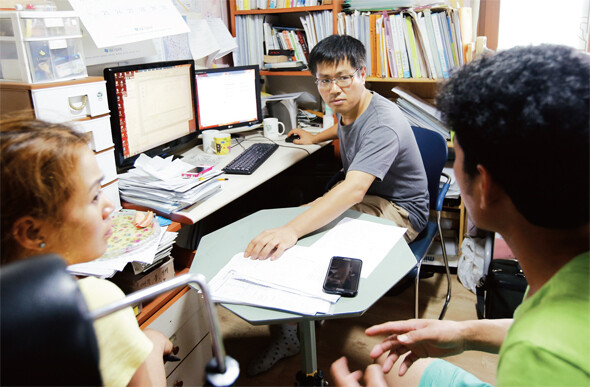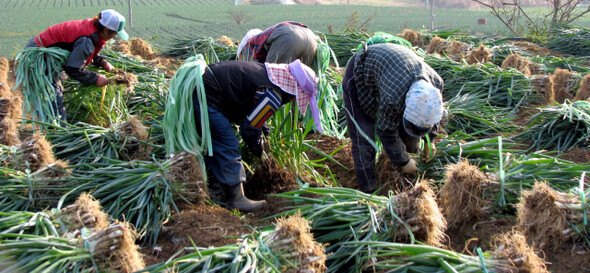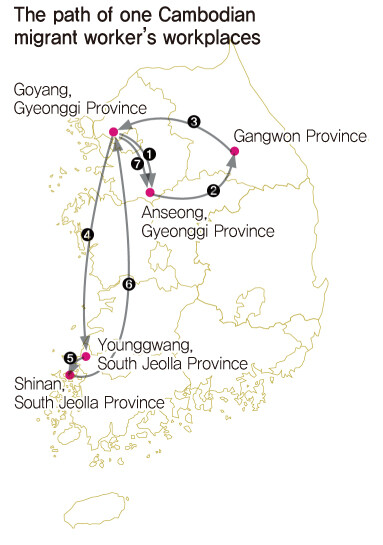hankyoreh
Links to other country sites 다른 나라 사이트 링크
Foreign workers live behind daunting language barrier

A few years ago, “S,” a 33-year-old migrant farm worker from Cambodia, found herself being shuttled around South Korea, without any way to communicate. When she first met her boss in May 2012, he drove her to Iksan, North Jeolla Province. The actual workplace listed on the contract she read was in Gangneung, Gangwon Province. S ended up going from Iksan to Gangneung, and then on to Yesan, South Chungcheong Province; Pyeongtaek, Gyeonggi Province; Anseong, Gyeonggi; and Taean, Asan, and Seosan, all in South Chungcheong. Her jobs took her to fields of sweet potatoes, cabbage, ginseng, potatoes, radishes, and onions. Every time her boss had no work at his own fields, he would hire S out illegally throughout the country. S questioned his actions, but without Korean language ability, she had no way to articulate her questions. She also had no one to ask and, for several months, no cell phone. Without any way to turn her words into something that would make sense, her world seemed bleak. S was terrified for her future.

For migrant workers contesting contracts in a country that doesn’t speak their language, the language barrier can be the root of all suffering. Interpreting services have been severely lacking ever since companies began hiring migrants to do the jobs the South Koreans of today eschew.
Smooth communication is a must, not just for the labor environment, but also for the hiring environment among employers.
Interpreting services for migrant workers who are in South Korea through the Employment Permit System are provided by local branches of the Korea Support Center for Foreign Workers (KSCFW) and the Human Resources Development Service of Korea (HRDSK). The HUG Korea counseling center for foreign workers also provides interpreting and counseling support by phone.
But a National Human Rights Commission of Korea (NHRCK) report last year on the human rights of agricultural migrant workers found the three organizations to have a combined total of 139 permanent and 671 non-permanent interpretation and translation staff, as of 2012. For most of the countries dispatching agricultural workers (with the exception of Vietnam, which ranked first in those areas at the time of the study), there is an acute shortage of interpreting staff. Cambodia has since overtaken Vietnam in terms of migrant workers in agriculture. Yet there is exactly one Khmer interpreter at present in all the country’s employment centers.
Workers on the employment permit system come to South Korea from 15 countries. Interpreters at the counseling centers “cover” roughly five to ten languages, which are selected according to the population distribution of migrant workers in the regions where the centers are located. If the center does not have any interpreters who speak a visiting worker’s language, the worker is put through to HUG Korea’s telephone counseling service. Although the system operates on the basis of country-to-country contracts, certain languages simply aren’t covered in a way that would support those agreements.

With seven KSCFW branches around the country, accessibility is an inherent problem for migrant workers. When word gets around that a particular migrant workers’ assistance group has an interpreter who speaks an underrepresented language, workers from that country will come from all over South Korea.
“We hired a marriage migrant from Thailand as a semi-permanent interpreter at our own expense, and the number of counseling requests we got quintupled,” said Father Lee Jong-min of Shalom House, a facility in Paju, Gyeonggi Province that assists migrant workers.
The lack of interpreters has sometimes led to discrimination in industrial accident claims. As of July 2013, the approval rate for occupational disease claims was 61.23% for South Korean workers, but just 28.97% for migrant workers. Lawmaker Chang Ha-na of the Democratic Party (now the New Politics Alliance for Democracy) suggested at the time that the situation might have something to do with the lack of any interpreters on the Korea Workers‘ Compensation and Welfare Service staff.

“When a migrant worker who has an occupational disease is unable to speak Korean well, it becomes tremendously difficult to prove that overwork or workplace conditions are responsible for the disease without the services of an interpreter,” Chang said last year.
Meanwhile, many migrant workers have complained of difficulties asserting their rights without interpreting services. An Amnesty International report titled “Bitter Harvest: Exploitation and Forced Labour of Migrant Agricultural Workers in South Korea,” quoted a 25-year-old from Vietnam identified as “EN” as saying he had been victimized as a result of job center discussions conducted entirely in Korean without an interpreter.
“I didn’t understand Korean so I didn’t know what was going on. No one bothered to explain and no interpretation was provided. The boss just told me to sign a document. I didn’t know what it was for because it was only in Korean,” EN was quoted as saying.
The signature voided EN‘s contract, preventing him from applying for a visa extension.
Another common complaint is that the interpreters tend to take the employer’s side.
“The interpreter at the job center was a fellow Cambodian, but while they gave detailed explanations of the things my boss said, they gave only short explanations for what I said,” recalled a 25-year-old Cambodian woman identified by the initial “P.”
“I asked the interpreter, and they said if it turned into too much of a problem, the Korean bosses wouldn‘t hire Cambodian workers anymore, and then there wouldn’t be as many people coming from Cambodia,” P added. “They said I should just put up with it.”
Kim yi-chan, who heads the group Earthians’ Station, said dispute arbitration cases often “go in strange directions” because the interpreters are unaware of labor relations laws. Indeed, the NHRCK report also emphasized the importance of hiring and educating interpreting staff.
For female marriage migrants, the Ministry of Gender Equality and Family offers interpreting services through the Danuri Call Center. The focus is more on support for multicultural families, which means less of an emphasis on human rights for marriage migrants.
“We hire our own interpreters to staff the counseling center, but we can’t cover all languages because of the cost,” explained Song Ok-jin of the Women Migrants Human Rights Center of Korea.
“When a worker comes from one of the countries we don’t have an interpreter for, we’ll sometimes ‘borrow’ staff from other groups,” Song added.
Fr. Lee Jong-min said much of the problem stems from the Employment Permit System itself.
“Because it’s based on such short cycles (three years to four years and 10 months), it’s difficult for workers to get used to Korean,” he explained. “The more limited the sojourn periods are, the more urgent it becomes to have interpreters.”
Language, after all, is a human right.
By Lee Moon-young, Hankyoreh 21 staff reporter
Please direct questions or comments to [english@hani.co.kr]http://h21.hani.co.kr/arti/economy/economy_general/38437.html

Editorial・opinion
![[Column] Kim and Putin’s new world order [Column] Kim and Putin’s new world order](https://flexible.img.hani.co.kr/flexible/normal/500/300/imgdb/original/2024/0625/9617193034806503.jpg) [Column] Kim and Putin’s new world order
[Column] Kim and Putin’s new world order![[Editorial] Workplace hazards can be prevented — why weren’t they this time? [Editorial] Workplace hazards can be prevented — why weren’t they this time?](https://flexible.img.hani.co.kr/flexible/normal/500/300/imgdb/original/2024/0625/7817193028141614.jpg) [Editorial] Workplace hazards can be prevented — why weren’t they this time?
[Editorial] Workplace hazards can be prevented — why weren’t they this time?- [Editorial] Seoul failed to use diplomacy with Moscow — now it’s resorting to threats
- [Column] Balloons, drones, wiretapping… Yongsan’s got it all!
- [Editorial] It’s time for us all to rethink our approach to North Korea
- [Column] Why empty gestures matter more than ever
- [Editorial] Seoul’s part in N. Korea, Russia upgrading ties to a ‘strategic partnership’
- [Column] The tragedy of Korea’s perpetually self-sabotaging diplomacy with Japan
- [Column] Moon Jae-in’s defense doublethink
- [Column] S. Korea-China cooperation still has a long way to go
Most viewed articles
- 1Blaze at lithium battery plant in Korea leaves over 20 dead
- 2How sanctions are backfiring to fuel a new Eurasian alliance
- 3Foreign day laborers make up majority of death toll in Korean battery factory fire
- 4[Column] Kim and Putin’s new world order
- 5[Editorial] Workplace hazards can be prevented — why weren’t they this time?
- 6[Editorial] Seoul failed to use diplomacy with Moscow — now it’s resorting to threats
- 7What made Korea’s lithium battery plant fire so deadly
- 8Enough trash-slinging — it’s time to pursue ‘strategic communication’
- 9After Putin’s Pyongyang summit, Seoul and Moscow play dangerous game
- 10North Korea sends another batch of trash balloons into South